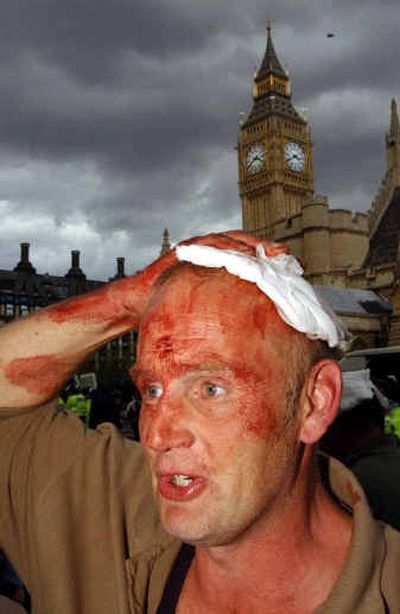Protesters get onto floor of Parliament

LONDON – Five protesters angry at plans to ban foxhunting managed to get onto the floor in Britain’s House of Commons and accosted members before being dragged off by ushers dressed in traditional long-tailed coats and buckled shoes.
In spite of the intrusion, Parliament outlawed hunting with dogs by a margin of 356-166. The result fulfilled a Labor Party pledge dating to the start of Prime Minister Tony Blair’s government in 1997 to end the centuries-old sport.
But the vote was overshadowed by the second serious breach of security in this country in three days, renewing fears that safeguards in Britain are inadequate and that the prime minister and royal family could be vulnerable.
Members of Parliament were shaken when the protesters somehow penetrated several levels of security, walked past private offices used by Blair and Chancellor Gordon Brown, and entered the chamber through doorways that are supposed to be tightly restricted.
“Totally unacceptable,” said Mark Oaten, a member with the Liberal Democrat Party. “Clearly the way things operate now is not working.”
Officials promised an immediate investigation, amid suspicions that a pro-hunting lawmaker may have aided the intruders. Other security reviews were under way at Buckingham Palace, where on Monday a protester scaled a fence and wall to reach the balcony customarily used by Queen Elizabeth II when she greets her subjects.
Parliament was in mid-debate on the foxhunting legislation at 4:20 p.m. when four men in white pro-hunting T-shirts suddenly emerged from behind the chair used by the speaker, and another dashed in from the opposite direction.
“This isn’t democracy! You are overturning democracy!” a protester shouted as he stood before Rural Affairs Minister Alun Michael, the confrontation broadcast live on television.
Deputy Speaker Sylvia Heal sounded an alarm and suspended the session while doorkeepers wrestled the protesters from the room. Debate resumed after about 20 minutes. Blair was not present for the melee.
Skirmishes outside were hardly less pitched. An estimated 10,000 rural residents organized by the Countryside Alliance assembled outside Parliament, some dressed as foxes, carrying placards denouncing Blair’s government and the proposed ban.
As Parliament Square filled up during the day, protesters were squeezed and pushed into barricades. At one stage, outnumbered officers used truncheons to beat protesters back, their blows opening wounds on the heads and faces of those in the front ranks.
“They just piled in and gave everybody a good licking,” said one protester, who declining to identify himself.
Protesters threw firecrackers, bottles and smoke bombs.
In previous years, attempts to ban foxhunting were blocked by the House of Lords, the other chamber of Parliament. This time, the government announced that it would invoke a rarely used law to override any such move.
“They are trying to change a way of life that has been around since civilization began,” said demonstrator Wendy Parkes, from Suffolk, in east England. She and her three children all foxhunt, she said. “This is a law made by people who don’t understand about life and death in the countryside.”
Blair was hoping to postpone the effective date of the ban until after the next general election, expected within 18 months. Parliament agreed, voting Wednesday night to make the ban take effect in July 2006.
The ban applies only to England and Wales – Scotland had enacted its own law limiting foxhunting – and applies only to the traditional hunts that use hounds to chase the prey.
Animal rights groups celebrated the vote. “It is the result that we have been waiting for a long time,” said Rob Atkinson, wildlife director for the Royal Society for the Prevention of Cruelty to Animals.
Activists have worked for years to ban foxhunting, saying the sport is cruel not only to the foxes and hares that are hunted but also the horses and dogs used in the hunt. Proponents say hunting allows a humane and necessary cull of foxes, which kill fowl and livestock, and provides rural jobs.